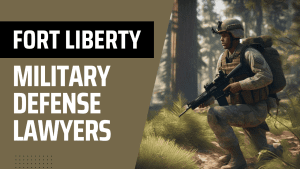For military servicemembers and their families, navigating the complexities of military law can be daunting, especially when facing allegations that could jeopardize a military career. Whether you’re confronting charges under the Uniform Code of Military Justice (UCMJ), dealing with administrative discipline, or trying to understand the implications of a potential discharge, it’s vital to be informed about your rights and options.
The Significance of Understanding Military Law
In the military, legal frameworks differ significantly from civilian law, making it more crucial than ever for servicemembers to comprehend these processes. Military law governs all aspects of military life, ensuring discipline while simultaneously safeguarding the rights of servicemembers. However, facing allegations, whether genuine or false, can lead to serious consequences including court-martial, disciplinary actions, and separation from service. A recent survey revealed that nearly 20% of servicemembers questioned the fairness of how their cases were handled—a statistic that underscores the urgency of having robust legal representation.
Common Concerns in Military Law
Many servicemembers and their families share similar concerns when confronted with UCMJ actions, criminal allegations, or administrative issues. Some common questions include:
- What constitutes a violation of the UCMJ?
- What are the potential outcomes of a court-martial?
- How can I defend myself against these allegations?
- What are my rights during an investigation?
- How do I choose the best military defense lawyer?
Navigating the UCMJ: Key Insights
Understanding the UCMJ is critical for any servicemember facing charges. The UCMJ is a federal law enacted by Congress that provides legal standards for all military members. It includes offenses from minor infractions to serious crimes.
Types of Military Offenses
- Article 120 (Sexual Offenses): This section addresses various sexual offenses, including sexual assault and harassment.
- Article 134 (General Article): This covers a range of offenses that can include anything that violates good order and discipline.
Knowing the specifics of these articles can help you identify the nature of your charges and potential defenses.
Response Strategies When Facing Allegations
If you find yourself under investigation, it’s essential to take specific steps that can protect your rights and your career:
- Stay Calm and Cooperate: Initially, it’s crucial to remain calm. Cooperation can help manifest goodwill, but you should also understand that you’re entitled to legal representation during any interview.
- Hire a Competent Civilian Military Defense Lawyer: Look for seasoned military attorneys who specialize in UCMJ violations and have a deep understanding of military procedures. Having the right legal support can make a substantial difference in the outcome of your case.
- Document Everything: Keep a record of all communications and events related to the investigation. This documentation may be critical in contesting accusations or establishing a timeline.
- Prepare for Adverse Outcomes: Learn about the potential consequences such as court-martial, nonjudicial punishment (NJP), or administrative separation. The earlier you prepare for these outcomes, the easier it will be to formulate a defense strategy.
Understanding Court-Martial
A court-martial can result in serious penalties, including incarceration and dishonorable discharge. The process is different from civilian courts and cannot be taken lightly. Below are the key steps in a court-martial process:
- Investigation Phase: An investigation is launched where evidence is collected.
- Pre-Trial Procedures: This includes preliminary hearings and arraignment.
- Trial: The trial will occur, typically before a panel of military officers, and is governed by specific rules different from civilian law.
Navigating these phases with the assistance of experienced court-martial attorneys is integral to protecting your rights.
Handling Administrative Disciplinary Actions
Administrative actions differ from criminal charges but can still have severe ramifications. For instance, you may face:
- Letters of Reprimand: A formal document that outlines misconduct can adversely affect your military career.
- Show Cause Boards: These proceedings determine whether a servicemember should retain their position or be separated.
Rebutting a GOMOR
A General Officer Memorandum of Reprimand (GOMOR) can be damaging but it is possible to rebut. Here’s how:
- Understand the Accusations: Carefully read and understand the allegations within the GOMOR.
- Gather Evidence: Collect documents or testimonies that support your case.
- Write a Formal Response: Be concise and factual in your rebuttal while maintaining a respectful tone.
- Submit Timely: Ensure your response is submitted within the specified window for rebuttal.
Why Expert Legal Representation is Crucial
Military law is a specialized field that requires a thorough understanding of both legal and military context. Here’s why hiring the best civilian military defense lawyer is essential:
- Expertise in Military Protocols: Military attorneys often possess specific training and background to navigate UCMJ matters effectively.
- Avoiding Pitfalls: They can help you avoid common errors during investigations or trials that might otherwise lead to unfavorable outcomes.
- Strategic Defense Planning: They are equipped to analyze cases and create strategies tailored to your unique circumstances, making them a valuable ally throughout your proceedings.
Addressing False Accusations
Unfortunately, false allegations are not uncommon in the military, especially regarding sexual misconduct. To defend against false allegations:
- Seek Immediate Legal Counsel: Do not attempt to handle false accusations alone; legal guidance is vital.
- Cross-Examine Witnesses: If applicable, your attorney can help cross-examine witnesses to expose inconsistencies in their testimonies.
- Use Character References: Collect references from trusted servicemembers who can attest to your character and reliability.
Conclusion: Safeguarding Your Military Career
Facing allegations under the UCMJ, whether true or false, can be a threatening experience. The legal environment can seem overwhelming, but understanding the framework of military law can empower you as you navigate these challenges.
If you or a loved one are facing legal issues in the military, don’t hesitate to reach out for help. Contact Gonzalez & Waddington, Civilian Military Defense Lawyers, at 1-800-921-8607 for a free consultation. Our experienced team represents servicemembers worldwide and is dedicated to protecting your rights and your career.
Remember, the sooner you involve military attorneys who specialize in these cases, the better positioned you will be to safeguard not only your career but your reputation as well.



